Papers by Alfonso Langle
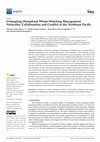
Water, 2024
Humpback whales face emerging anthropogenic challenges such as entanglement in abandoned fishing ... more Humpback whales face emerging anthropogenic challenges such as entanglement in abandoned fishing gear and stranding during their winter migration. Such challenges require collective action solutions involving diverse stakeholders across jurisdictions, social sectors, and geographies. Collaborative governance systems involve conflictual and collaborative interactions. We used a quantitative approach (social network analysis) to map the structure of three social networks: Collaboration in disentanglement, collaboration in stranding, and conflict. We administered a face-to-face survey to 38 stakeholders from four social sectors across seven coastal localities from April to November 2021. We also obtained perspectives from the same stakeholders about pressing conflicts, rule compliance, and law enforcement regarding whale-watching management in the region using a semi-structured questionnaire. We found hints of different dimensions of collaboration occurring simultaneously: Coordination, cooperation, and conflict. Networks played distinct roles in promoting collaboration across sectors, and while the disentanglement network coordinated civil society and the public sector, the stranding network facilitated cooperation within the public sector. The most pressing social conflicts detected by stakeholders were pleasure boats, abandoned fishing gear, and poor rule compliance regarding the distance between boats and whales. Our results suggest that in the context of institutional weakness, collaborative social networks play a crucial role in the management and conservation of coastal and marine common-pool resources.
Keywords: collaboration; conflict; humpback whale; environmental collaborative governance; entanglement in fishing gear; convergent mixed method; strandings; whale watching tourism
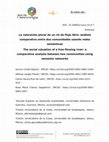
Tecnología y Ciencias del Agua , 2024
Los ríos de flujo libre (RFL) se caracterizan por su conectividad fluvial integra y por proveer m... more Los ríos de flujo libre (RFL) se caracterizan por su conectividad fluvial integra y por proveer múltiples beneficios a las comunidades asentadas en ellos. Sin embargo, a nivel mundial estos tipos de ríos se encuentran amenazados por la construcción de obras de infraestructura. En ocasiones, la pluralidad de valores que las comunidades le atribuyen a estos ríos no se toma en cuenta, particularmente al momento de planificar proyectos de desarrollo lo que podría detonar conflictos ambientales. Se analizaron los valores sociales asociados al Río los Horcones (RLH) entre dos localidades, río arriba (Las Juntas y Los Veranos) y río abajo (Boca de Tomatlán). A partir del análisis de 35 entrevistas y el uso redes semánticas, se encontró que ambas comunidades tienen un interés común por la protección y conservación del río Los Horcones. Sin embargo, se observa una ponderación diferencial de valores específicos por localidad. Río abajo (Boca de Tomatlán) predominan los valores intrínsecos y relacionales, dado que el RLH es fundamental para la diversificación de sus medios de vida. En contraste, río arriba (Las Juntas y Los Veranos) predominan los valores relacionales e instrumentales debido a la dependencia económica del turismo de naturaleza que se realiza en el RLH. El reconocimiento de la pluralidad de valores asociados a los ríos de flujo libre es esencial para la formulación de estrategias de manejo y conservación de los recursos hídricos.
15(7), 1279, 2023
This article is an open access article distributed under the terms and conditions of the Creative... more This article is an open access article distributed under the terms and conditions of the Creative Commons Attribution (CC BY
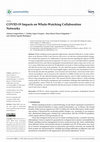
Sustainability, 2022
Whale-watching tourism generates high-income seasonal livelihoods in coastal communities on the M... more Whale-watching tourism generates high-income seasonal livelihoods in coastal communities on the Mexican Pacific Coast; however, this sector is at risk from accelerated global changes. We evaluated the responses of a collaboration of tourism networks regarding the impacts COVID-19 using a longitudinal social network approach. We used a two-wave snowball method to identify potential interviewees and followed geographic and jurisdictional criteria using a face-to-face survey to map collaboration ties between 38 stakeholders involved in whale-watching tourism before and after the second wave of the pandemic. We also asked this group of stakeholders about their perceived impacts of COVID-19. We found slightly higher connectivity and centralization levels in the social networks after the pandemic. Loss of income and reservations, a decrease in both conservations and pollution, and an increase in the reduction in wildlife tourism were the main self-reported impacts. We also detected harmful pandemic legacies, such as whale-watching tours conducted using unregulated private boats. This research directly informs Mexico's whale-watching tourism policy by showing the management and coordination challenges that stakeholders face in a post-pandemic context. While the social fabric of coastal communities has been resilient to the COVID-19 pandemic, we found indications that the governance of marine resources can easily unravel if rule of law is absent.
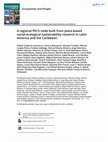
Ecosystems & People , 2021
Sustainability requires a combination of meaningful co-production of locally relevant solutions, ... more Sustainability requires a combination of meaningful co-production of locally relevant solutions, synthesis of insights gained across regions, and increased cooperation between science, policy and practice. The Programme for Ecosystem Change and Society (PECS) has been coordinating Place-Based Social-Ecological Sustainability Research (PBSESR) across the globe and emphasizes the need for regional scientific nodes from diverse biocultural regions to inform sustainability science and action. In this paper, we assess the strengths of the PBSESR communities in Latin America and the Caribbean (LAC). We provide an overview of PBSESR literature associated with this region and highlight the achievements of two prominent regional networks: The Social-Ecological Systems and Sustainability Research Network from Mexico (SocioEcoS) and the South American Institute for Resilience and Sustainability Studies from Uruguay (SARAS Institute). Finally, we identify the potential in these nodes to constitute a regional PECS node in Latin America and discuss the capacity needed to ensure such function. The results of the literature review show that while still loosely interconnected across the region, networks play key roles in connecting otherwise cloistered teams and we illustrate how the SocioEcoS network (focusing on transdisciplinary co-production of knowledge towards sustainability) and the SARAS Institute (focusing on innovative approaches for looking at complex social-ecological problems, rooted in slow science and arts) operate as key connectors in the region. We conclude that these organizations combined can embody a Latin American node for PECS, and would thereby not only contribute to regional but also global capacities to advance the sustainability agenda.
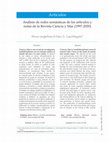
Ciencia y Mar, 2021
Ciencia y Mar es una revista de investigación multidisciplinaria con un enfoque relativo al estud... more Ciencia y Mar es una revista de investigación multidisciplinaria con un enfoque relativo al estudio del mar y la zona costera. El objetivo de este trabajo es revisar sistemáticamente los artículos y notas publicadas en la revista entre 1997 y 2020. Para tal fin se analizaron el título, resumen y palabras claves de 247 publicaciones en dicha revista. Se utilizó un análisis de redes semánticas para identificar los temas más preponderantes, así como los principales grupos temáticos. Se encontraron bajos niveles de interconectividad entre términos, lo que sugiere un conjunto pobre de vínculos semánticos y poca integración de grupos de conceptos. El número de términos prominentes es muy reducido con base en su frecuencia y centralidad. Se encontraron seis grupos temáticos: 1) trabajos sobre peces, tortugas (marinas y terrestres) y corales; abordados desde una perspectiva taxonómica, ecológica y económica; 2) trabajos con enfoques biofísicos y edafológicos; 3) estudios taxonómicos sobre aves y algas en islas y zonas costeras del Pacífico; 4) trabajos con enfoques ecológicos y biofísicos en manglares, así como pesquerías de camarón en el Golfo de California; 5) estudios sobre bacterias; 6) estudios sobre regulación y gobernanza de los recursos marinos y costeros. La publicación de trabajos transdisciplinarios podría mejorar la interconectividad e integración de los conceptos en la Revista Ciencia y Mar.
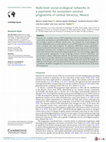
Environmental Conservation , 2020
Payments for ecosystem services (PES) programmes have been considered an important conservation m... more Payments for ecosystem services (PES) programmes have been considered an important conservation mechanism to avoid deforestation. These environmental policies act in social and ecological contexts at different spatial scales. We evaluated the social-ecological fit between stakeholders and ecosystem processes in a local PES programme across three levels: social, ecological and social-ecological. We explored collaboration among stakeholders, assessed connectivity between forest units and evaluated conservation activity links between stakeholders and forest units. In addition, to increase programme effectiveness, we classified forest units based on their social and ecological importance. Our main findings suggest that non-governmental organizations occupy brokerage positions between landowners and government in a dense collaboration network. We also found a partial spatial misfit between conservation activity links and the forest units that provide the most hydrological services to Xalapa. We conclude that conservation efforts should be directed towards the middle and high part of the Pixquiac sub-watershed and that the role of non-governmental organizations as mediators should be strengthened to increase the efficiency and effectiveness of the local PES programme.
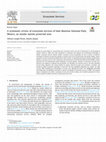
Ecosystem Services Journal, 2020
Islands are good models to conceptualize how ecosystem services are part of interactions in socia... more Islands are good models to conceptualize how ecosystem services are part of interactions in social-ecological systems. However, efforts have been insufficient to synthesize and integrate the accumulated knowledge of islands' ecosystem services. Holistic islands' ecosystem services assessments are key to achieve an effective translation of research into decision making, in contexts such as loss of biodiversity and climate change. Using a systematic review of 58 studies published from 1964 to 2019, we identified associations between environments, habitats, ecosystem services, their components and beneficiaries in Islas Marietas National Park (IMNP), marine protected area and international tourist destination in western Mexico. Analysis of occurrence and data visu-alization were applied to synthesize the information. We identified 12 ecosystem services, the most quantified services being migratory and nursery habitat for species, followed by gene pool protection, recreation and tourism in marine ecosystems, especially in coral reefs. The most quantified component was "supply" for eight services. Main beneficiaries of knowledge of services were information brokers. We highlighted substantial knowledge gaps and identified constraints to advance knowledge of ecosystem services in IMNP. We proposed steps to incorporate the islands' ecosystem services into decision making, and visualized pathways for future social-ecological synthesis research in marine protected areas.
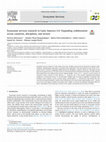
Ecosystem services research in Latin America 2.0: Expanding collaboration across countries, disciplines, and sectors, 2020
Ecosystem services research in Latin America has been steadily growing and has advanced conceptua... more Ecosystem services research in Latin America has been steadily growing and has advanced conceptual under-standings, methodological approaches, and global policy applications. One key element for the success of ecosystem services research is expanding collaboration across disciplines, countries, and sectors. This paper sets the stage for the special issue on The state of the art of Ecosystem Services Research and Practice in Latin America that resulted from such collaborations and the resulting insights. To do so we: 1-present a recent overview of ecosystem services research in Latin America, 2-assess the role of the network organizing International Congresses on Ecosystem Services in the Neotropics (CISEN, from its initials in Spanish) in fostering collaborations across countries, sectors, research topics, and disciplines, 3-describe how this special issue was conceived and operationalized to further break collaboration silos and advance understanding, and 4-present an overview of the papers included in this special issue. Finally, we discuss the challenges and opportunities for future contribution of Latin American research to the rapidly evolving Ecosystem Services literature.
IPBES Global Assessment on Biodiversity and Ecosystem Services , 2019
In this chapter of the IBES Global Assesment on Biodiversity and Ecosystem Services we explored h... more In this chapter of the IBES Global Assesment on Biodiversity and Ecosystem Services we explored how global transformation involved key tradeoffs, and inequalities, as growing interactions drove economic growth but also degradation. Accelerations in consumption & interconnection have had tradeoffs.
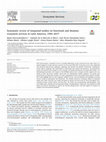
Ecosystem Services, 2019
This article presents a systematic review of scientific publications on the ecosystem services to... more This article presents a systematic review of scientific publications on the ecosystem services topic with an in-
tegrated approach in Latin American countries for the period 1992–2017. Ecosystem services were subdivided into functional (provisioning, regulating, supporting and cultural) and thematic (biodiversity, hydrological, carbon capture, landscape, soil) classifications to demonstrate their mutual interconnection. An integrated ap- proach was assumed when ecological, social, economic, and political dimensions converged within studies. As a methodological procedure, the sequence of the PRISMA protocol and a semantic network analysis were con- ducted to select and review scientific articles from two international scientific databases. The articles were characterized according their evolution over time, geographical location and predetermined analysis variables. The results highlight that the most frequently analyzed services were provisioning and regulating ecosystem services related to hydrological and biodiversity. The timeline showed an increasing number of integrated studies since 2009, with most case studies developed at regional and local scales for forest and fishing socio- ecological systems in Brazil, Mexico and Costa Rica. The studies were predominantly multidisciplinary, with clear public policy demand and governmental funding. Transdisciplinary studies have the potential to build plural and inclusive knowledge to improve the decision-making process and offer support for solutions to complex socio-environmental problems.
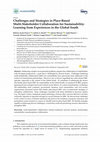
Addressing complex environmental problems requires the collaboration of stakeholders with diverge... more Addressing complex environmental problems requires the collaboration of stakeholders with divergent perspectives, a goal that is challenged by diverse factors. Challenges hindering multi-stakeholder collaboration (MSC) for sustainability have previously been addressed in the context of transnational partnerships. However, less is known regarding how place-based MSC operates, especially in the context of the Global South. To contribute to addressing the factors that hinder place-based MSC for sustainability in the Global South, we analyzed 38 MSC projects spanning diverse ecological and social contexts across Mexico. In a series of participatory workshops, 128 stakeholders from academia, government, business, local communities, and civil society organizations discussed factors that hinder place-based MSC and co-constructed strategies to strengthen collaboration. Some challenges coincided with those identified in previous studies (e.g., divergent visions, inadequate project planning), whereas other concerns that have not been commonly regarded as important emerged as crucial obstacles for MSC. We discuss these challenges in the context of areas of limited statehood and point to the traditions of popular education and participatory action research as a source of valuable tools for place-based MSC. We identify strategies capable of addressing diverse challenges, a result that could aid prioritizing resource allocation to strengthen MSC.
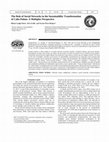
Coastal tourism is often caught in a crossfire between economic benefits, ecological impacts and ... more Coastal tourism is often caught in a crossfire between economic benefits, ecological impacts and social tensions. Development of large-scale resorts can reduce the provision of certain ecosystem services and threat local people's livelihoods. Social networks might influence the transitions of governance systems into new adaptive models. We focus on the role of multiplex networks in the process of sustainability transformation by examining social networks that protected a marine reserve against the construction of a large scale development. The multiplex network exhibited a structure with five blocks: " scale-crossing brokers " , " visible leaders " , " ecosystem managers " , " visionaries " and " public sector ". This last block was structurally isolated from the rest of organizations. Multiplex networks facilitated the coordinated mobilization of information and resources across spatial scales. " Scale-crossing brokers " with the aid of " visible leaders " propelled up the local conflict toward national and global arenas, affecting the decision of Mexico's federal government to annul large scale resort's construction. Understanding the social processes that enable adaptive governance systems is crucial for sustainability transformations and resilience of coastal ecosystems.
Book chapters by Alfonso Langle
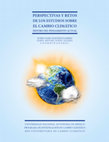
Perspectivas y retos de los estudios sobre el cambio climático dentro del pensamiento actual, 2021
La degradación forestal es una de las principales causas del incremento de CO2 atmosférico y, en ... more La degradación forestal es una de las principales causas del incremento de CO2 atmosférico y, en consecuencia, del cambio climático. El análisis de las percepciones ambientales sobre degradación forestal ofrece información crucial sobre el proceso de toma de decisiones por parte de actores locales, permitiendo orientar intervenciones para el manejo de los socioecosistemas. Para examinar la percepción sobre la degradación de la selva seca, uno de los ecosistemas más emblemáticos del país y con mayor número de habitantes, se seleccionó una localidad de la costa del Pacífico. Se obtuvieron 28 mapas cognitivos de actores heterogéneos en cuanto a edad, actividad económica y tiempo de residencia en la localidad. Estos mapas reflejaron las percepciones de los actores locales sobre degradación forestal y fueron analizados con métricas de redes. Los resultados mostraron que la percepción de la degradación forestal está asociada principalmente a causas naturales como huracanes y sequías. Mujeres, jóvenes y actores dedicados a actividades secundarias se identificaron como grupos clave en el entendimiento del cambio climático. Estos resultados enfatizan la necesidad de involucrar a estos grupos en la toma de decisiones y en las acciones hacia la adaptación y resiliencia al cambio climático de las comunidades rurales de México.
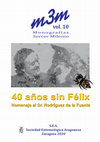
40 años sin Félix Homenaje al Dr. Rodríguez de la Fuente, 2020
La obra del naturalista, documentalista y activista Félix Rodríguez de la Fuente influyó en la cr... more La obra del naturalista, documentalista y activista Félix Rodríguez de la Fuente influyó en la creación de áreas naturales protegidas, produjo cambios en la percepción social de especies amenazadas (como lobos y aves rapaces) y contribuyó en el reclutamiento de profesionistas dedicados al comportamiento animal, la conservación de la vida silvestre y la divulgación de la ciencia. Para comprender
el legado de Rodríguez de la Fuente, se realizó una revisión de literatura de las bases de datos Scopus. Se encontraron seis publicaciones (2012-2019), la mayoría en idioma español, cuyos autores en suma pertenecen a instituciones españolas y estadounidenses. Los trabajos versaban sobre cuatro aspectos: i) estudios biográficos; ii) análisis de elementos comunicativos como las técnicas de reconstrucción documental utilizadas en el “El Hombre y la Tierra” o la narrativa épica de la serie televisiva “Planeta Azul”; iii) estudios sobre la influencia sociopolítica de Rodríguez de la Fuente a través de la televisión pública en la cultura general y las políticas de conservación de España, y iv) análisis comparativos de experiencias significativas en la vida de Aldo Leopold, Ernest T. Seton y Félix Rodríguez de la Fuente, como detonantes de la promoción de una ética ambiental. La obra escrita y radiofónica es una veta poco explorada del amplio legado de Félix Rodríguez de la Fuente en la conservación de la biodiversidad.
We describe the networks of bird watchers and their implications for the conservation of biodiver... more We describe the networks of bird watchers and their implications for the conservation of biodiversity in Western Mexico.
Technical report by Alfonso Langle
Scientific notes by Alfonso Langle










Uploads
Papers by Alfonso Langle
Keywords: collaboration; conflict; humpback whale; environmental collaborative governance; entanglement in fishing gear; convergent mixed method; strandings; whale watching tourism
tegrated approach in Latin American countries for the period 1992–2017. Ecosystem services were subdivided into functional (provisioning, regulating, supporting and cultural) and thematic (biodiversity, hydrological, carbon capture, landscape, soil) classifications to demonstrate their mutual interconnection. An integrated ap- proach was assumed when ecological, social, economic, and political dimensions converged within studies. As a methodological procedure, the sequence of the PRISMA protocol and a semantic network analysis were con- ducted to select and review scientific articles from two international scientific databases. The articles were characterized according their evolution over time, geographical location and predetermined analysis variables. The results highlight that the most frequently analyzed services were provisioning and regulating ecosystem services related to hydrological and biodiversity. The timeline showed an increasing number of integrated studies since 2009, with most case studies developed at regional and local scales for forest and fishing socio- ecological systems in Brazil, Mexico and Costa Rica. The studies were predominantly multidisciplinary, with clear public policy demand and governmental funding. Transdisciplinary studies have the potential to build plural and inclusive knowledge to improve the decision-making process and offer support for solutions to complex socio-environmental problems.
Book chapters by Alfonso Langle
el legado de Rodríguez de la Fuente, se realizó una revisión de literatura de las bases de datos Scopus. Se encontraron seis publicaciones (2012-2019), la mayoría en idioma español, cuyos autores en suma pertenecen a instituciones españolas y estadounidenses. Los trabajos versaban sobre cuatro aspectos: i) estudios biográficos; ii) análisis de elementos comunicativos como las técnicas de reconstrucción documental utilizadas en el “El Hombre y la Tierra” o la narrativa épica de la serie televisiva “Planeta Azul”; iii) estudios sobre la influencia sociopolítica de Rodríguez de la Fuente a través de la televisión pública en la cultura general y las políticas de conservación de España, y iv) análisis comparativos de experiencias significativas en la vida de Aldo Leopold, Ernest T. Seton y Félix Rodríguez de la Fuente, como detonantes de la promoción de una ética ambiental. La obra escrita y radiofónica es una veta poco explorada del amplio legado de Félix Rodríguez de la Fuente en la conservación de la biodiversidad.
Technical report by Alfonso Langle
Scientific notes by Alfonso Langle
Keywords: collaboration; conflict; humpback whale; environmental collaborative governance; entanglement in fishing gear; convergent mixed method; strandings; whale watching tourism
tegrated approach in Latin American countries for the period 1992–2017. Ecosystem services were subdivided into functional (provisioning, regulating, supporting and cultural) and thematic (biodiversity, hydrological, carbon capture, landscape, soil) classifications to demonstrate their mutual interconnection. An integrated ap- proach was assumed when ecological, social, economic, and political dimensions converged within studies. As a methodological procedure, the sequence of the PRISMA protocol and a semantic network analysis were con- ducted to select and review scientific articles from two international scientific databases. The articles were characterized according their evolution over time, geographical location and predetermined analysis variables. The results highlight that the most frequently analyzed services were provisioning and regulating ecosystem services related to hydrological and biodiversity. The timeline showed an increasing number of integrated studies since 2009, with most case studies developed at regional and local scales for forest and fishing socio- ecological systems in Brazil, Mexico and Costa Rica. The studies were predominantly multidisciplinary, with clear public policy demand and governmental funding. Transdisciplinary studies have the potential to build plural and inclusive knowledge to improve the decision-making process and offer support for solutions to complex socio-environmental problems.
el legado de Rodríguez de la Fuente, se realizó una revisión de literatura de las bases de datos Scopus. Se encontraron seis publicaciones (2012-2019), la mayoría en idioma español, cuyos autores en suma pertenecen a instituciones españolas y estadounidenses. Los trabajos versaban sobre cuatro aspectos: i) estudios biográficos; ii) análisis de elementos comunicativos como las técnicas de reconstrucción documental utilizadas en el “El Hombre y la Tierra” o la narrativa épica de la serie televisiva “Planeta Azul”; iii) estudios sobre la influencia sociopolítica de Rodríguez de la Fuente a través de la televisión pública en la cultura general y las políticas de conservación de España, y iv) análisis comparativos de experiencias significativas en la vida de Aldo Leopold, Ernest T. Seton y Félix Rodríguez de la Fuente, como detonantes de la promoción de una ética ambiental. La obra escrita y radiofónica es una veta poco explorada del amplio legado de Félix Rodríguez de la Fuente en la conservación de la biodiversidad.